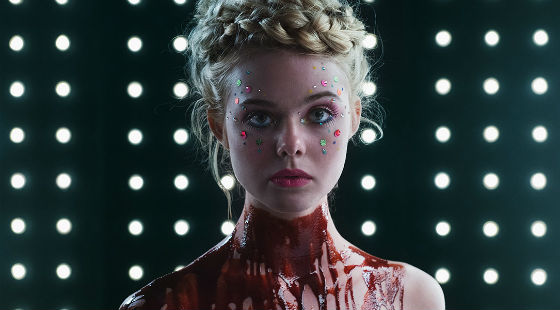The Neon Demon

ELLE FANNING as Jesse in Nicolas Winding Refn's THE NEON DEMON.

Writer/director Nicolas Winding Refn’s elegy to the 80’s riffs endlessly off the visuals of better directors (DePalma, Mann, Cronenberg, Lynch) while succumbing to its own conceits.
Elle Fanning plays Jesse, the typical naif in a sun dress and braids, telegraphing her ingenue-off-the-bus status to her fellow models—clearly L.A. natives in their bodices, skin-tight leather jeans and Aviators. The joke played best in Verhoeven’s SHOWGIRLS, in which Elizabeth Berkeley arrives in Las Vegas, a wide-eyed optimist from Bumblefuck, U.S.A., leeches off the sweetest (read: dumbest) boy in town, and climbs to the top of the entertainment world ladder. The genius of filmmakers like Verhoeven and DePalma was that one could never quite tell whether they were in on the joke or not. Where’s Kyle MacLachlan when you need him to spell it out?*
Jesse befriends make-up artist Ruby (Jena Malone), whose unrequited attraction veers the plot into manufactured unease as a setup for a tonal and narrative shift that makes no sense. Absent is the necessary connective tissue walking us logically from Ruby’s ill-timed come ons to her misguided turn. Instead, we get a disjointed series of vignettes that tell a less coherent story than 117 minutes of Human League, DEVO and Talking Heads music videos spliced together indiscriminately. There was a great opportunity for Refn to take notes from DRESSED TO KILL (De Palma) and make a bolder statement about sexuality, gender identity and power, but instead he opts for the more worn-out trope of the has-been’s revenge. The has-been, Sarah (Abbey Lee), and her protege, Gigi (Bella Heathcote), engage in psychological warfare with Jesse. Undeterred, Jesse becomes Queen of the Plastics—errr, the new hot commodity.
Verhoeven had the sense to toy with the sexual tension between Gina Gershon’s Cristal Connors and Berkeley’s Nomi Malone, but Refn plays it straight. It’s fine that this turns it into black comedy akin to Mary Harron and Gwen Turner’s AMERICAN PSYCHO, but when a filmmaker imagines himself and his work to be high-minded “events”, evinced by the aura and awe manufactured through NEON DEMON’S publicity campaigns, it’s awfully pedestrian of him to reduce the story to a pissing match with less depth than the feud between Regina George and Cady Heron in MEAN GIRLS. In MEAN GIRLS and SHOWGIRLS, both approach the macabre humor of PSYCHO—Regina gets hit by a bus, Cristal gets thrown down a flight of stairs. An empty pool in Los Angeles? Why not just toss her off the U.S. Bank Tower with a faulty wing suit so she can crash face-first into the side of the Bonaventure? If you’re going to mock your own art flick with a Los Angeles cliché…
Refn is too engrossed in false color nostalgia, replicating the moods and palettes of the 80s, like Panos Cosmatos (BEYOND THE BLACK RAINBOW) or the retro-wave hipster bands of late–copying the sound and fashion, but never bothering to listen to the lyrics.
* Keanu Reeves cast against type as a child predator seems less motivated by his acting chops—spanning the entire gamut of blank—than an attempt to update the joke hoping Millennials might get it. After the fact, reading scads of reviews and comments comparing this film to BLACK SWAN (2010), both the story and the subtext (if any) are completely lost on them anyway. So too is a casting stunt meant to contrast with a diametrically-opposed role ten years older than Aronofsky’s SHOWGIRLS-meets-FIGHT CLUB on crazy pills.